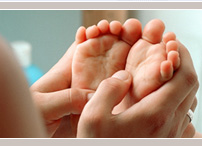 |
 |
 |
 |
 |
eNewsletters |
|
| Neuroethics, Tides Center and Scholar Blogger |
| ACT Theatre Event Invitation, August 2006 |
| Invitation and WBP Update, August 2006 |
| Summer ASBH Pre-Conference, June 2006 |
| Books, Bioethics, and Jodi Picoult, April 2006 |
| Women's Bioethics Project Book Club, April 2006 |
| Making a Difference, January 2006 |
| God's Bioethics?, November 2005 |
| Tribute to Our Founding Scholars, October 2005 |
| Katrina, 3 Updates, and an Invite, September 2005 |
| Follow-up on Women and Aging, August 2005 |
| Women and Aging, April 2005 |
|  |
Press Releases |
 |
Events Calendar |
 |
Archives |
 |
|
 |
|
 |
 |
|
 |

Most of us are familiar with the storied beginnings
of various software companies that were started by men in their garages. The
Women's Bioethics Project was started, appropriately enough, by a woman in her
kitchen.
I had just been granted a leave from my graduate studies at Harvard Divinity
School and was back in Seattle. During my course of study at Harvard I realized
that the world didn’t need another bioethicist, what it needed was a way to
get women’s underrepresented voices heard in current bioethics debates. In studying
bioethics and public policy, it was quite obvious that women’s life experiences
were not being taken into account by the largely male population of lawmakers.
Alone in my kitchen, I cooked up the idea of a think tank focused keenly on
women and bioethics. It was one of those pivotal and defining moments.
I needed a reality check, so I contact Dr. Kelly Fryer-Edwards, a professor
at the University of Washington, School of Medicine who I had met the summer
before during my internship there. I asked Kelly if she would be willing to
meet to discuss a wild idea. She was game.
We began to hold a series of dinners with Seattle-area scholars to discuss what
this think tank could become. Over Thai food and beer, quiche and wine, we debated
approaches, structures, issues, and funding. Week by week we went from a blank
piece of paper to paragraphs to a framework. Before we knew it we had a strategic
plan, and ultimately, a business plan. I thought my time at Microsoft had prepared
me for intense debate, but these scholars pulled no punches. It was arduous
yet scintillating work.
Finally, last October, one year ago today, we felt confident that we had a workable
plan. At that point Kelly and I decided it was time to make a pilgrimage to
the birthplace of bioethics: The Hastings Center. Kelly arrived in upstate New
York by train; I arrived by car with a malfunctioning GPS. We had an appointment
to review our plan with the scholars at the Hastings Center, which became an
exciting and turbulent day of intense feedback. That night Dr. Thomas Murray,
President of The Hastings Center, and his wife Cynthia, took us to dinner. Over
pasta and wine, Tom gave use wise counsel and pledged his support. The evening
ended with hugs all around. The Women’s Bioethics Project had been born.
Kelly and I returned to Seattle with the formidable task of actually implementing
the plan. We have worked hard and accomplished a lot since that autumn day in
New York, more than we ever dreamed, really. I’d like to commemorate it by thanking
the scholars who spent many hours building the Women’s Bioethics Project. They
only asked for one thing: if the think tank became as successful as we all dreamed
it would be, that I promise not to be seduced by the lure of media-grabbing
issues like cloning but instead remember the bioethics issues like poverty,
access to health care, and looking after children and the elderly that truly
affect women’s lives. It is a promise I intend to keep.
Assistant Professor, Department of Philosophy, Seattle University
Co-founder, Ceptyr
Assistant Professor, Medical History and Ethics, University of Washington,
School of Medicine
Women's Studies, University of Colorado at Boulder
National Center for Ethics in Health Care (VHA)
Assistant Professor, Medical History and Ethics, University of Washington,
School of Medicine
Assistant Professor of Philosophy, University of Washington
Associate Professor and Chair of Religious and Social Ethics, University
of Puget Sound
Harborview Medical Center
Assistant Professor, Medical History and Ethics, University of Washington,
School of Medicine
University of Washington Medical Center
Assistant Professor, Medical Anthropology, University of Washington
Researcher, Medical History and Ethics, University of Washington,
School of Medicine
|
 |

